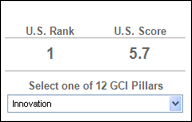
The U.S. is losing its competitive edge due to the fallout from the financial crisis, growing government debt and widening deficits, according to a report on global competitiveness issued this month by the World Economic Forum.
The report showed the U.S. slipping from second to fourth place overall in the forum's annual Global Competitiveness Index ranking. Switzerland, Sweden and Singapore ranked higher.
The U.S. economy is still considered structurally sound and productive, the report said, but a number of escalating weaknesses are seen as holding the nation back. Government debt and deficits constitute "the greatest area of weakness," and mapping out a clear exit strategy would be key to reinforcing American competitiveness, the authors wrote.
Use the interactive chart below to see how the U.S. measured up:
The U.S. failed to break into the top 100 in five areas:
- National Savings Rate: The U.S. was ranked 130th with savings rate of 8.5 as a percent GDP. Only Serbia, Greece, Malta, Swaziland, Zimbabwe and Mail ranked lower. Oil-rich Kuwait takes the top spot with a rate of 54.1 as a percent of GDP.
- Business Cost of Terrorism: The U.S. was ranked 125th with a score of 4.5. By comparison, Israel was ranked 105th with a score of 5.1. Only in the Philippines, India, Algeria, Mauritania, Burundi,Uganda, Egypt, Kenya, Sri Lanka, Turkey, Lebanon, Nepal, Pakistan and Columbia is the business cost of terrorism greater, the report said. A score of 1 equals significant cost, while a score of 7 equals no cost.
- Government Debt: The U.S. was ranked 122nd with 83.2 debt as a percent of GDP. By comparison, Greece was ranked ranked lower at 133rd with 119 debt as a percent of GDP. Japan ranked 137 with 217.6 debt as a percent of GDP.
- Government Budget Balance: The U.S. ranked 117th with a deficit equal to 7.9 percent of GDP. Iceland ranked the lowest at 139 with a deficit equal to 15.5 percent of GDP. For the year, only 17 of the countries surveyed, showed balanced budgets or surpluses.
- Soundness of Banks: The U.S. ranked 111th with a score of 4.4. Ireland ranked the lowest with a score of 2.0. and Canada ranked the highest with a score of 6.7. A score of 1 means the banks are insolvent, while a score of 7 indicates that the banks are healthy.
China and India, both rising economic powers, ranked higher than the U.S. in all but one of the five problem categories. India ranked just below the U.S. when looking at the business cost of terrorism. See a complete breakdown of how the U.S. measured up to the 138 other countries that participated in the survey: United States Country Profile (PDF)
About the WEF's Global Competitiveness Index
The GCI is based on 12 broad measures of competitiveness or pillars including: institutions, infrastructure, macroeconomic environment, health and primary education, higher education and training, goods market efficiency, labor market efficiency, financial market development, technological readiness, market size, business sophistication, and innovation.
The rankings were calculated using publicly available data and the Executive Opinion Survey, a comprehensive annual survey conducted by the World Economic Forum together with its network of research institutes and business organizations. For this year's survey, over 13,500 business leaders were polled in 139 economies.
Alternative Perspectives
The WEF report did rank the U.S. first in innovation and several other categories that are considered crucial for future economic growth. Meanwhile, a separate report by Newsweek ranked America second in economic dynamism.
In its first annual Best Countries ranking, the magazine ranked the U.S. 11th overall.
The nation has seen some decline, but remains indispensable, wrote Michael Hirsh. "Even battered and beaten down, American power is more resilient than the naysayers give it credit for. And so is the international system that depends on American power as its central stabilizer. What the declinists tend to miss is the fact that there really are no rivals to the United States."
Deborah Wince-Smith shares that view. The president of the Council on Competitiveness, rebutted the findings of the WEF report and claimed that the American economy is primed for an 'innovation surge.' She cited the nation's economic dynamism and $400 billion in research and development spending in 2008. That's more than three times what China is spending and a billion dollars more than the European Union, according to Wince-Smith. She credited the U.S. with creating 600,000 new businesses, but said that information was not included in the report. The Council on Competitiveness said that the WEF report also, "undervalues the potential for massive growth through the nation's innovative capacity."
What Do You Think?
Is the U.S. falling behind other developed countries?
Use State of the USA's interactive tools to see for yourself where the U.S. stands internationally in health, the economy and education.
Share your thoughts in the comments section below or weigh in on Facebook or Twitter.
Data visualization by Anthony Calabrese, a State of the USA Web producer.